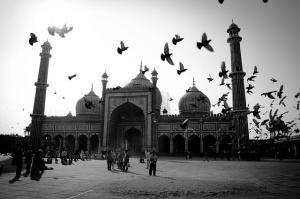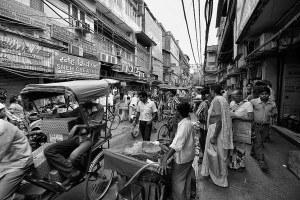
New Delhi and its people are full of contrasts. The menaces of greed and violence, the degradation of people and land, the juxtaposition of natural beauty and man-made horror and, finally, the sublime joy of human love, sacrifice and loyalty are always, everywhere, on full display. The world seems to shed all shyness here and display every possible permutation of beauty and sadness on these old, old streets.
Charity Spring is about caring for our world and helping those who care. I noticed something disturbing within myself today. Giving is its own reward, but when is giving harmful? Am I one to judge? How can I discern who are the deserving poor and who among us are not being honest about their capacity to care for themselves? And then there is the universal and time-worn dilemma of whether to give money to an addict who really does need nourishment and acts of human kindness to help keep him or her tethered to the world of the living, but who you are quite certain will spend the money on the addiction?
Several days ago, a list of America’s Worst Charities was published. It was the result of a yearlong collaboration between the Tampa Bay Times and the California-based Center for Investigative Reporting, the nation’s largest and longest serving nonprofit newsroom dedicated to watchdog journalism. CNN joined the partnership in March 2013.
Such a damning assessment of fake charities exploiting the goodness of donors wanting to do the right thing. Horrendous findings. Many hundreds of millions of dollars raised from a giving public thinking they were really giving to the brand name charities that the corrupt ones named themselves after.
While I was walking towards the metro station in Old Delhi recently, I saw this man. He seemed to me like he was a healthy man, sitting comfortably on the path that lead to the subway with hands folded and eyes closed. He didn’t say a word. He was just sitting there, but with what seemed to be an imitation of pain on his face. Now I say imitation because from the direction I was walking he caught my eye early and it was a lengthy walk before I reached the place where he sat. I noticed that he squinted his eyes to steal looks at the passers-by, though he seemed want to to appear to be blind. Some kind people were dropping coins in the plate just strategically placed before him.
India is a rather interesting place to live and New Delhi tops the list of cities I’ve seen. The contrasting shades of life are so painful that you almost cry — and sometimes do. While you see people flying past in a Porsche, you also see some people literally dying in the streets from hunger and exposure.
Our society thankfully has created many shelter houses and free food distribution systems. In some ways this support system, as needed as it is, both elevates and demotes people who are destitute. Beyond the minimum sustenance required for survival, what is there to aspire to, to hope for?

Mother Teresa once said, and I think it has something important to say to what disturbs me here, that being unwanted, unloved, uncared for, forgotten by everybody, is a much greater hunger, a much greater poverty than the person who has nothing to eat. Elsewhere she wrote or said, “Only in heaven will we see how much we owe to the poor for helping us to love God better because of them.” Is it for me to judge?
What am I to think or do about individuals and charities that at least seem to be exploiting the goodness of others? Give blindly or use deceit as an excuse not to care — not to see?
Whether or not that man I saw in the subway was truly blind and destitute, is there ever enough cause to stop us from caring, whether or not we are being deceived? Is caring its own reward?
